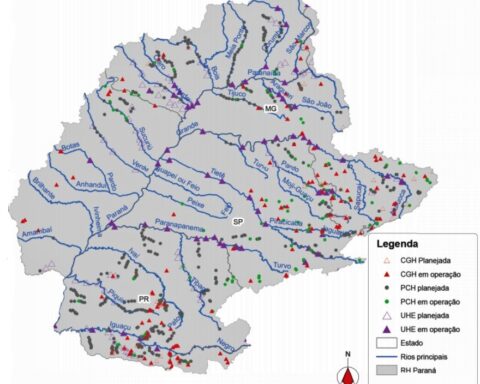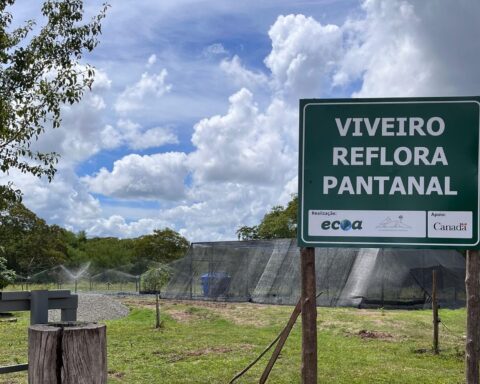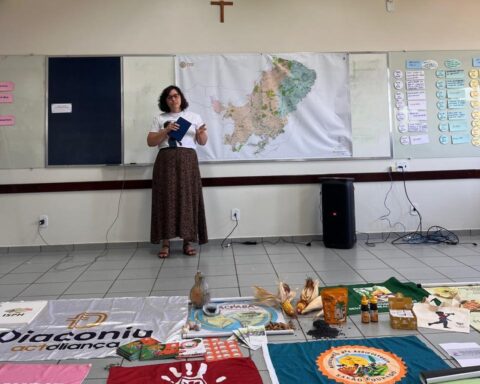We, the following civil society groups [xxx], welcome the opportunity to contribute recommendations to the consultation process of the Inter-American Investment Corporation’s (“IDB Invest” or the “Bank”) Implementation Guidelines (“Implementation Guidelines”). The signatories to this submission are human and environmental rights organizations that support communities impacted by projects funded by development finance institutions, including by IDB Invest. This document builds on our complementary analyses of IDB Invest’s information disclosure practices in relation to the revision of its Access to Information Policy (“Policy”)[1] and the IDB Invest’s Environmental and Social Sustainability Policy.[2]
We, the following civil society groups [xxx], welcome the opportunity to contribute recommendations to the consultation process of the Inter-American Investment Corporation’s (“IDB Invest” or the “Bank”) Implementation Guidelines (“Implementation Guidelines”). The signatories to this submission are human and environmental rights organizations that support communities impacted by projects funded by development finance institutions, including by IDB Invest. This document builds on our complementary analyses of IDB Invest’s information disclosure practices in relation to the revision of its Access to Information Policy (“Policy”)[1] and the IDB Invest’s Environmental and Social Sustainability Policy.[2]
We express concern about key omissions that undercut the intent of the Policy. Specifically, we are concerned about the failure to reference or explain the core principles committed to within the Policy, which are intended to ground both the spirit and the practice of information disclosure. In addition, we are disappointed that – similar to the Policy – the Implementation Guidelines introduce additional vague, prejudicial and discretionary language, and fail to provide clear guidance and direction on how to interpret and implement such provisions. Furthermore, much of this subjective language serves the purpose of carving out additional exceptions to those indicated in the Policy. Throughout, we were disappointed at the lack of specificity and guidance provided to ensure robust information disclosure. Finally, in the Public Consultation Report produced as a follow-up from the public consultation process on the Policy, IDB Invest committed to addressing several comments and recommendations in the Implementation Guidelines. Unsatisfactorily, the Implementation Guidelines inadequately address many of these points.[1]
Given these shortcomings, we strongly recommend a second draft of the Implementation Guidelines be produced which stays faithful to the language outlined in the Policy and provides guidance on implementation for each section and provision. Furthermore, we continue to recommend the Bank reach out to interested stakeholders – including civil society, past requesters of information, affected communities, access to information experts, Bank and independent accountability mechanism officials, and academics – to collaborate in creating a robust implementation and monitoring process for the new Policy, including for a second draft of these Implementation Guidelines.
Our analysis below expands on these general comments, and provides detailed recommendations on the content of the Implementation Guidelines.
Purpose and Principles
The current draft could benefit from a stronger framing at the outset that explicitly references and expands on the overall principles listed in Section II.C of the Policy.
Instead, as currently drafted, the Implementation Guidelines dive straight into the “Classification” of information created and received by IDB Invest, without providing clarity on the overall purpose of the document, or explaining the framing of the Policy, including the principles that ground it. What is lost, as a result of this omission, is the spirit and central tenets which should underpin the interpretation and implementation of the Policy and Implementing Guidelines by IDB Invest staff.
For instance, we welcomed the recognition in the Policy of the human right to access information,[1] including the express recognition of this right under global and regional human rights instruments, but were perplexed to find this crucial framing absent in the Implementing Guidelines. During the in-person and written consultation period, we welcomed the shift in title and language from “Disclosure of Information Policy” to the adopted Access to Information Policy, because this change in language frames this Policy within the human rights framework.
This critical foundation must be evident within all provisions of the Implementation Guidelines and further explained in the introduction, in order to ensure that this understanding is operationalized in practice by IDB Invest staff implementing the Policy. As we highlight throughout this submission, the Implementation Guidelines must reflect and convey that the public has the right to seek and obtain information, and reinforce that this right is not at the discretion of IDB Invest to give. Additionally, the Implementation Guidelines offer a key opportunity for IDB Invest to ensure its staff understand the importance of this Policy for those affected by the
Bank’s operations in enabling their meaningful participation in the design and implementation of projects – to both mitigate harm and ensure that local development priorities are met.
In addition, the Implementation Guidelines should explicitly reference that the “Policy is governed by the principle of maximizing access to information”[1] and in so doing, that “IDB Invest commits to proactively disclose as much public information as possible regarding its governance and activities”;[2] “it establishes a presumption in favor of disclosure, subject to a list of clear and well-defined exceptions”;[3] that the IDB Invest “seeks . . . to work [with its clients and third parties] to increase the transparency of their commercial activities …”;[4] that the overall aim is to provide simple and broad access to information to communities and other stakeholders; and that where IDB Invest denies a request for information, it will explain its decision and provide a right of review. These principles ground the Policy with a specific ethos and intention that should be central during implementation.
We strongly recommend that a section be added to the beginning of the Implementation Guidelines explaining the significance of framing the Policy as one that recognizes access to information as a fundamental human right, the importance and interpretation of the principles in relation to the
implementation of the Policy, and the purpose of the Implementation Guidelines themselves.
Finally, we recommend that the introduction to the Implementation Guidelines clearly articulate the purpose of this document – to provide guidance to IDB Invest staff on how to effectively implement the Policy, including mitigating challenges and strengthening access to information for communities affected by IDB Invest operations. In particular, given the increasing threats to environmental and human rights defenders in the Latin American and Carribean region, we recommend that the Implementation Guidelines include specific reference to the problem of shrinking civic space and the constraints that may therefore be in place for those seeking to access and obtain information on development projects. This contextual framing is key to ensuring that the Implementation Guidelines promote a people-centered operationalization of the Policy, that reinforces access to information as a human right .
Exceptions
In our previous submissions, we noted with concern that the overly broad scope of exceptions could, in practice, undercut the institution’s commitment to the principle of “maximum disclosure.”[1] We regret to note that in the Implementation Guidelines, the logic of classification of documents as secret continues to follow a pattern that is in direct opposition to the “maximum disclosure” principle. To comply with the human right to information, IDB Invest needs to apply the three part test in case it considers that any information could potentially be classified as secret.[1] The express inclusion of a three part test in the Implementing Guidelines would also provide clarity for staff in interpreting and implementing the Policy. The rationale for classifying information under broad and often vague categories considered secret does just the opposite. Exacerbating this, the Positive Override test proposed by the institution goes on to confirm that the Bank considers disclosure of information to be its right and not a human right. We continue to recommend that Bank documents respect, protect and fulfil the right to information as a human right and refrain from treating it as a privilege of the institution and, sometimes, even a privilege of its clients.
Paragraph 56 of the Implementation Guidelines, in reference to possible Positive Override cases, goes beyond considering information secrecy as a right of the Bank, but innovates when stating that not all rights are legitimate enough for information to be transferred to the public realm. Only “legitimate rights”[1] could transform what is considered secret, without previous detailed and reasoned analysis, into public information. The vagueness in language by the Bank in this case is inexplicable from a human rights standpoint. If IDB Invest insists on continuing to use the Positive Override test, it should at least make it clear that all human rights are legitimate rights to be considered as a part of the test.
Commercially Sensitive Information
Similar to the Policy, the Implementation Guidelines continue to use vague language to carve exceptions, notably through the use of the expression “or other non-public information…” Such an open-ended formulation opens the door to unreasonable interpretations and puts the spirit of the Policy in jeopardy. The illustrative examples used in the Implementation Guidelines confirm our assertion: the second example rules out the possibility of the public knowing how members of their own State have voted in relation to projects making use of public money; the third example goes on to covertly give IDB Invest clients the power to veto information just by identifying it as secret, in a seeming exclusion of the already problematic Positive Override test. Information shared with a public institution in order to receive public financing should be considered of public interest and only subject to secrecy when falling under narrow and legitimate exceptions. Illustration number III advocates for just the opposite. Therefore, we reiterate our recommendation to eliminate such vague language (“or other non-public information…”).
Financial Information
IDB Invest once again uses broad language to determine what will not be disclosed.[1] The Bank affirms that information will not be published if it could possibly hurt the financial interest of the institutions or its clients. This position
rejects any possibility of human or environmental rights interests being considered legitimate interest that trump commercial and financial interests. By that logic, any documents that would otherwise be public but that could indicate a violation of a right, such as the right to be consulted, will be kept from the public.
The second illustrative example, for instance, seems to prevent the public from knowing at what interest rates public money is expected to be loaned to financial intermediaries, as intermediaries use public money to increase private gains through expected return rates. The public should be able to assess at what cost this intermediation is being conducted.
The third illustrative example also highlights that sometimes a balance needs to be struck and a solution needs to be found that preserves the right of clients to secrecy while guaranteeing that discrimination will not be a part of credit rating assessments.
The aforementioned observations confirm our initial statement of this section – that the language is too broad and possibly detrimental to rights. We recommend that the Implementation Guidelines confirm and provide explicit examples and guidance for instances where human and environmental rights concerns could legitimately trump financial and commercial information.
Deliberative Information
As the Policy recognizes, IDB Invest is an “international financial institution to which public funds have been entrusted …” and as such, it “is accountable for the use and management of its resources.”[1] The Implementing Guidelines state that “[w]hen the deliberative process has concluded, and a decision has been made, IDB Invest makes public the final decision, results, and agreements that emerge from these processes,” providing a non-exhaustive list of documents that the IDB Invest for which does not provide access. Citizens have a right to know how their countries are voting in relation to specific investments, including in Board discussions. The intention is not to prevent the free and candid exchange of ideas, but to make information available for citizens so they know how their own governments are planning for development that affects their lives and environment. It is unfortunate that the Bank has not replicated best practice in its Policy. Nonetheless, we continue to recommend that IDB Invest follow the lead of other international institutions,[2] demonstrating that meetings of public organization themselves should be public, and not only their minutes.[3]
Legal, Disciplinary, or Investigative Matters
While it is understandable that IDB Invest refrains from disclosing information about legal procedures while they are still occuring, once concluded, the Bank should commit to disclosing information about the results of the proceedings – regardless of their outcome. In particular, as a public institution, it stands to reason that the Bank must publicly inform and recognize when the result of the proceedings show that the institution and/or its staff have violated or witnessed violations of human and environmental rights. In cases of this magnitude, the Bank cannot justify that it will not publish information due to a risk of facing litigation. It is indeed possible and at times probable that the Bank might face litigation when its legal proceedings reveal that violations have occurred. As an institution operating with public financing, IDB Invest should publish the results of these proceedings and face the consequences before the public that finances the institution.
Communication of Executive Directors’ Offices
As a public institution utilizing public money, IDB should repeal illustration number III. Agendas of Executive Directors and Bank management should be made public and transparent so as to build public trust and guarantee no preferential treatment in relation to clients or States vis-a-vis communities or civil society organizations advocating for human and environmental rights in specific investments or in relation to specific policies. It is problematic that the Guidelines continue to support an example of the Policy the contributes to more opaqueness within IDB Invest.
Security and Safety
While very important to preserve the safety and security of all stakeholders, the Implementation Guidelines continue to replicate the broadness and vagueness of the Policy. We continue to recommend that the Bank defines what is information that “could endanger the national security of a member country”; or “could endanger the life, health or safety of any individual or the environment if disclosed”.[1] Again, a document aimed at providing concrete guidance for operationalizing the Policy should refrain from vague and discretionary language in all instances.
It is important to know, for instance, how transparency in relation to IDB Invest investments or conduct could possibly endanger the environment instead of doing just the opposite. It is also important to know how the Bank will prevent broad and subjective interpretation of the term “national security” to the detriment of legitimate interests of transparency when dealing with cases of, for instance, widespread or consistent human and environmental rights violations.[2]
Personal Information
While there are legitimate reasons to keep personal information secret, the second illustrative example given in this section has absolutely no harbour in best practices
of access to information of public institutions.[1] Selection and appointment process of people that will work for and/or receive income from a public institution should be completely transparent and justified. Diverging from this best practice would open doors for personal favours, corruption and other cases of misconduct. The transparency of such selection processes would, on the other hand, guarantee a fair and optimise process in the interest of the public.
Environmental and Social Information
Previous submissions as part of the Access to Information Policy review and consultation process have underscored the need for IDB Invest to prioritize access to environmental and social information for communities affected by the Bank’s investments.[2] Many of the recommendations offered directly spoke to the implementation of the Policy, and revealed serious shortcomings in the Bank’s current information disclosure practices.
Given this prior engagement, we are disappointed that the Implementation Guidelines fail to provide any concrete guidance on improving the quality and intent of IDB Invest’s disclosure practices, beyond repeating the provisions of the Policy
itself. As the primary document guiding IDB Invest staff involved in operationalizing the Policy, the Implementation Guidelines should embed the ethos of its principles and understanding of access to information as a human right, and the importance of information disclosure for those affected by the Bank’s operations – particularly with regard to environmental and social information.
Acting upon the findings and recommendations of previous contributions, the Implementation Guidelines should clearly convey that access to information is the foundation for the meaningful engagement and participation of those affected by the Bank’s operations. In particular, the Implementation Guidelines should provide explicit guidance on how to ensure the language used in the Investment Summary and Environmental and Social Review Summary (ESRS) is accessible for a broad audience with examples, such as instructions to refrain from using acronyms or overly technical language. In addition, the Implementation Guidelines should recommend that IDB Invest staff clearly outline the applicable safeguards, and identify which environmental and social documents were mandated to be produced for the project in question, including Environmental and Social Action Plans (ESAPs) and stakeholder engagement plans. To strengthen transparency, the Implementation Guidelines should instruct IDB Invest staff to also outline the rationale for the inapplicability of any environmental and social documents which were not required for the project in question.
As projects progress, information disclosure must be similarly dynamic. Again, as a document aimed at providing practical guidance for IDB Invest staff, it is insufficient for the Implementation Guidelines to state that information updates will be provided
“as necessary.”[1] In order to operationalize the Policy, the Implementation Guidelines should, at the bare minimum, provide examples for when an update would be necessitated – for example, when the status of a project changes, or when the nature of the project is adjusted – in order to ensure that communities and the public at large remain informed.
Confidential Environmental and Social Information
Paragraph 86 of the Implementation Guidelines establishes another vaguely worded exception to disclosure and further limits disclosure of information that is unquestionably of public interest.
With regard to possible environmental and social impacts, we believe there is no justification that merits keeping this information confidential. Communities and civil society require access to precisely this type of information in order to assess the impact to their rights and dialogue with the necessary stakeholders in order to avoid or remedy violations. What could and should be confidential is the individual information of those impacted by such violations. Such confidentiality can always be remedied via redaction of personal information, as it is of interest to the public and communities impacted to know if all members are being treated equally and fairly in, for instance, compensation negotiations.
However, the information that this section tries to omit is clearly and solely directed at the financial interests of the Bank and its clients, in complete disregard for the
public’s right to know. We strongly urge the removal of this section from the guidelines, as it contradicts the right to information.
Requests for Information
Further, we express serious concern and dismay at the addition of several prejudicial and discretionary provisions in section C.A of the Implementing Guidelines, which create ambiguous and unnecessary barriers to access information and which are absent from — and largely unsubstantiated by — the Policy.
While we welcome the assertion that “requesters are not required to provide any reason or proof of interest for their Request,”[1] Paragraphs 96, 97, 98 and 99 of the Implementation Guidelines make reference to “unreasonable or unsupported requests for information” – language that is not found in the Policy itself. These paragraphs give discretionary power to IDB Invest staff in determining the characteristics that fall in the realm of requests that are “unreasonable or unsupported,” language which itself is biased and prejudicial against those filing a request for information. This is further underscored in Paragraphs 97 and 106 where IDB Invest staff are instructed to undertake a “reasonable search” for the requested information.[2] Furthermore, while the Policy clearly states that the only circumstance where IDB Invest will deny a request for information is “when it determines that the information requested is “confidential” under the Policy exceptions”,[3] Paragraph 97 of the Implementation Guidelines creates another exception by stating that “IDB
Invest may refuse unreasonable or unsupported Requests for Information.”[1] Adding to this, Paragraph 98 of the Implementation Guidelines states that in situations where the request is “unreasonably broad” and “the Requester does not provide sufficient clarification, IDB Invest will refuse the Request pursuant to Paragraph 71 of the Policy.”[2] However, Paragraph 71 of the Policy does not provide for the refusal of information requests on these grounds, and simply outlines procedure for clarifying or narrowing the scope of requests.[3] Paragraph 99 continues to outline guidance on the assumption that refusal of information “in the case of unreasonable or unsupported Requests” is valid under the adopted Policy.
We are alarmed by the addition of these vague and discretionary loopholes that create subjective barriers to accessing information and reach far beyond the language of the adopted Policy within the Implementation Guidelines – an internally-facing document which does not require adoption. Although the language in the Policy is vague at times, the purpose of the Implementation Guidelines should be to clarify these ambiguities. Creativity in the Implementation Guidelines should be restricted to and focused on elaborating examples on existing Policy provisions, not creating new provisions that counter the very principles and ethos of the adopted Policy. We strongly recommend removing Paragraphs 97 through 99 and
excising all language in the Implementation Guidelines which uses prejudicial and discretionary terms, including differentiating between “unreasonable and unsupported” requests and “reasonable” searches.
Responding to Requests for Information
As outlined in the Implementation Guidelines, the proposed Transparency Hub fails to fulfil the criteria for an automated, intuitive, accessible and intelligent system. We recommend the creation of a system wherein information requests made by individuals would be automatically recorded in the system, along with the date the request was made and the date of its eventual response. Such an automated system would not only be useful to the requester, but also to Bank staff in monitoring and responding to requests..Such a system would further eliminate the necessity of a 5 days deadline to acknowledge the receipt of a request or an appeal. We urge the Bank to facilitate the implementation of the right to information by making an automated and intelligent Transparency Hub available to the public and its own staff. In such cases that a request was made by telephone, the information request should be recorded in the system by the staff member receiving the request and the protocol number should be given to the requester, along with the date when a response is due.
The Implementation Guidelines should refute the necessity of a statement by the requesters explaining the basis for an appeal. It cannot be presumed that requesters will have or should be required to have knowledge of the access to information norms and practices, or even the details of the Bank’s policies. It is the responsibility of Bank staff, the External Panel and the Board of Directors to know whether a denial of request did or did not follow such parameters and issue a decision in favor or against disclosure after such analysis.
While it is possible that Bank staff, External Panel or the Board need more than 30 days to answer to an appeal, this should not exempt these actors to have a fixed response deadline. Otherwise, these actors could not possibly be held accountable when not answering an appeal request. We recommend that the Implementation Guidelines establish a reasonable deadline for cases when additional time is required to respond to appeal requests.
In order to safeguard the independence of the External Panel from IDB Invest Management,[1] it is important that the selection process is made public[2] and that their selection is solely focused on their expertise in relation to information and transparency. The emphasis put by the Implementation Guidelines on people with focus on private sector is very misplaced. As we have repeatedly stated, the right to information is a human right, and its fulfillment, while taking into consideration the nature of the information, is not dependent on the public or seemingly private nature of the institution’s transactions. An expert on the theme will be to evaluate whether an information belongs to the public realm or is protected under the right to privacy, which is
detailed on the exceptions sections of the Implementation Guidelines and Policy.
Finally, it is important that IDB Invest leaves no one behind. While its Policy determines that requests can be made via telephone calls, the Implementation Guidelines do seem to embrace this type of accessibility when it comes to appeals. As stated above, requests made by telephone calls should be recorded at the Transparency Hub and requesters should receive a protocol number and a deadline for response. If the information requested is denied or if the requester receives no response, the Bank should accept an appeal also made by telephone call, which should also be recorded on the Transparency Hub while providing the requesters with a protocol number and a deadline for response.
***
IDB Invest should ensure that adequate resources and training are provided in order to ensure that implementation of the Policy is in line with the committed principles and the right to information. Additionally, the Bank should consider carrying out annual periodic public enquiries to gather experiences about the Policy’s operation and implementation to strengthen it, and perform regular and thorough reviews of both the Policy and Implementation Guidelines, in transparent and participatory processes.
We strongly urge IDB Invest to substantively revise the Implementation Guidelines, so that they not only address our concerns and recommendations, but become a
document that will successfully guide IDB Invest staff in understanding and applying the Policy, and fulfilling the right to information.
Signatories
International Accountability Project (IAP), International







